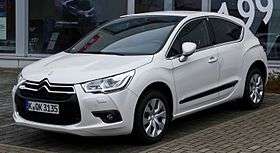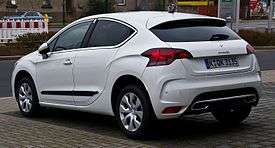DS 4
| DS 4 | |
|---|---|
 | |
| Overview | |
| Manufacturer |
Citroën (until 2015) DS Automobiles (since 2015) |
| Also called | Citroën DS4 (until 2015) |
| Production | 2010-present[1] |
| Assembly | Mulhouse, France (PSA Mulhouse Plant) |
| Body and chassis | |
| Class | Compact car (C) |
| Body style | 3+2 door hatchback coupe |
| Layout | FF layout |
| Platform | PSA PF2 platform |
| Related | Citroën C4 II |
| Powertrain | |
| Engine |
1.6 L I4 VTi 1.6 L I4 THP Turbo (155 or 200 hp) 1.6 L I4 HDi, e-HDI and (since 2015) BlueHDI Turbo-diesel 2.0 L I4 HDi, e-HDI and (since 2015)BlueHDI |
| Transmission |
5 or 6-speed manual 6-speed semi automatic ETG6 and (since 2015) 6-speed automatic EAT6 |
| Dimensions | |
| Wheelbase | 2,612 mm (102.8 in) |
| Length | 4,275 mm (168.3 in) |
| Width | 1,810 mm (71.3 in) (2,052 mm (80.8 in) with mirrors) |
| Height | 1,523 mm (60.0 in) |
| Kerb weight | 1,360–1,496 kg (2,998–3,298 lb) |
| Chronology | |
| Predecessor | Citroën C4 Coupé |
| Successor | DS 4S (China) |
The DS 4 is a compact car and it is the second model in the then new premium (luxury vehicle) DS sub-brand created by Citroën,now an independent brand. It was officially launched in 2011 internationally, but already on sale in some countries in late 2010.[2] Based upon the Citroën C4 II, it features raised suspension to resemble a compact SUV and repositioned door handles to give a coupe-like silhouette. The rear windows are fixed, and do not slide or open outwards[3]
At launch, the petrol engines that powered the DS 4 were all a product of a collaboration between PSA and BMW, all being 1,598 cc four-cylinder, 16-valve units. The base VTi 120 was normally aspirated and put out 120 PS (88 kW). As its name implies it came with variable valve timing. The next engine up was the THP 155, essentially a turbo-charged version of the VTi. It put out 156 PS (115 kW) thanks to a twin-scroll turbocharger and dual overhead cams and used a 6-speed manual transmission. The most powerful engine option was the THP 200, a variation of the THP 155, but with an output of 200 PS (147 kW).
Citroen initially offered two diesel engines in the DS 4 - the HDi 110, a 1,560 cc four-cylinder that put out 112 PS (82 kW) and the four-cylinder HDi 160 also found in the Citroën C5 sedan. It has a displacement of 1,997 cc and put out 163 PS (120 kW).
The current engine line-up differs significantly.
The DS 4 is available with Start&Stop technology and Citroën says that the battery has been optimized to withstand up to 600,000 starting cycles. The boot is 385 litres or 1021 litres with the back seats folded down.
The DS 4's styling has been very well received by the international press.
It was elected Most Beautiful Car of the Year at the International Automobile Festival,[4] beating BMW’s new F10 5 Series and Honda's new CR-Z hybrid car. German magazine Auto Bild and its partner magazines throughout Europe have given it 1st Prize for Design in its category in Design Award contest.[5]
Safety
| Euro NCAP test results | ||
|---|---|---|
| 5 door LHD Hatchback (2011)[6] | ||
| Test | Points | % |
| Overall: | ||
| Adult occupant: | 32 | 90% |
| Child occupant: | 39 | 80% |
| Pedestrian: | 15 | 43% |
| Safety assist: | 7 | 97% |

The European New Car Assessment Programme (Euro NCAP) (Europe’s rough equivalent to the U.S.’s IIHS) gave the DS4 a five-star rating overall. The Peugeot 508 was scored the same, with the only difference being a higher child occupant rating in the 508, and slightly higher pedestrian impact rating for the DS4.[7]
Engines
| Engines | ||||||
|---|---|---|---|---|---|---|
| Petrol engines | Diesel engines | |||||
| 1.6VTi | 1.6 THP 155 | 1.6 THP 200 | 1.6 HDi | 1.6 e-HDi | 2.0 HDi | |
| Production years | ||||||
| Engine Type | I4 16V naturally aspirated | I4 16V turbocharged | I4 8V common rail injection | I4 16V common rail injection | ||
| Displacement (cc) | 1598 | 1598 | 1598 | 1560 | 1560 | 1997 |
| Max power at r/min | 88 kW (120 PS; 118 hp) 6000 | 115 kW (156 PS; 154 hp) 6000 | 147 kW (200 PS; 197 hp) 5800 | 82 kW (111 PS; 110 hp) 3600 | 82 kW (111 PS; 110 hp) 3600 | 120 kW (163 PS; 161 hp) 3750 |
| Max torque at r/min | 160 N·m (118 lb·ft) 4250 | 240 N·m (177 lb·ft) 1400 | 275 N·m (203 lb·ft) 1700 | 270 N·m (199 lb·ft) 1750 | 270 N·m (199 lb·ft) 1750 | 340 N·m (251 lb·ft) 2000 |
| Transmission | 5-speed manual | 6-speed EMG | 6-speed manual | 6-speed manual | 6-speed EMG | 6-speed manual |
| Weight | 1,360 kg (2,998 lb) | 1,420 kg (3,131 lb) | 1,431 kg (3,155 lb) | 1,417 kg (3,124 lb) | 1,428 kg (3,148 lb) | 1,496 kg (3,298 lb) |
| Top speed | 193 km/h (120 mph) | 214 km/h (133 mph) | 235 km/h (146 mph) | 190 km/h (118 mph) | 190 km/h (118 mph) | 212 km/h (132 mph) |
| 0–100 km/h acceleration (s) | 10.8 | 9.0 | 7.9 | 11.3 | 11.3 | 8.6 |
| Fuel consumption (L/100 km) (urban) (extra-urban) | 6.2 8.3 5.0 | 6.5 9.0 5.1 | 6.4 8.4 5.2 | 4.7 5.9 4.0 | 4.4 4.8 4.1 | 5.1 6.6 4.3 |
| CO2 emissions (g/km) | 144 | 149 | 149 | 122 | 114 | 134 |
Production and sales
| Year | Worldwide Production | Worldwide sales | Notes |
| 2010 | 300[1] | 200[1] | |
| 2011 | 34,593[2] | 29,477[2] | Total production reaches 34,902 units.[2] |
| 2012 | 30,700[8] | 33,200[8] | Total production reaches 65,600 units.[8] |
DS 4 Crossback
| DS 4 Crossback | |
|---|---|
|
| |
| Overview | |
| Manufacturer | DS Automobiles |
| Production | 2015 - |
| Assembly | Mulhouse, France (PSA Mulhouse Plant) |
| Body and chassis | |
| Class | Compact car (C) |
| Body style | 3+2 door hatchback coupe Crossover |
| Layout | FF layout |
| Platform | PSA PF2 platform |
| Powertrain | |
| Transmission |
6-speed manual 6-speed automatic EAT6 |
| Dimensions | |
| Length | 4,284 mm (168.7 in) |
| Width | 1,810 mm (71.3 in) (2,052 mm (80.8 in) with mirrors) |
| Height | 1,535 mm (60.4 in) |
References
- 1 2 3 "Engine specs from PSA Peugeot Citroën" (PDF). Creator and designer. PSA Peugeot Citroën. Retrieved 4 December 2012.
- 1 2 3 4 "PSA Annual Report 2012" (PDF). Car manufacturers. PSA. Retrieved 1 May 2013.
- ↑ Post your review!. "Citroen DS4 reviews | Expert and user reviews". carwow.co.uk. Retrieved 2012-02-03.
- ↑ "Citroën DS4 Voted Most Beautiful Car of the Year". Citroën. Archived from the original on March 30, 2013. Retrieved March 21, 2013.
- ↑ "Citroën DS4 gets first prize in Auto Bild's design award contest.".
- ↑ "Euro NCAP results for 5 door LHD Hatchback" (PDF). euroncap.com. 2011.
- ↑ "Euro NCAP Peugeot 508 test". Car safety testing. Euro NCAP. Retrieved 21 March 2013.
- 1 2 3 "Memento Mars 2013" (in French). PSA Peugeot Citroën. 21 February 2013: 50. Retrieved 31 July 2013.
| « previous — Citroën car timeline, 1980s–present | |||||||||||||||||||||||||||||||||||||
|---|---|---|---|---|---|---|---|---|---|---|---|---|---|---|---|---|---|---|---|---|---|---|---|---|---|---|---|---|---|---|---|---|---|---|---|---|---|
| Type | 1980s | 1990s | 2000s | 2010s | |||||||||||||||||||||||||||||||||
| 0 | 1 | 2 | 3 | 4 | 5 | 6 | 7 | 8 | 9 | 0 | 1 | 2 | 3 | 4 | 5 | 6 | 7 | 8 | 9 | 0 | 1 | 2 | 3 | 4 | 5 | 6 | 7 | 8 | 9 | 0 | 1 | 2 | 3 | 4 | 5 | 6 | |
| Economy car | 2CV | ||||||||||||||||||||||||||||||||||||
| Off-roader | Méhari | ||||||||||||||||||||||||||||||||||||
| City car | C1 I | C1 II | |||||||||||||||||||||||||||||||||||
| Supermini | LN / LNA | AX | |||||||||||||||||||||||||||||||||||
| Dyane | Axel | Saxo | C2 | DS3 | |||||||||||||||||||||||||||||||||
| Visa | C3 I | C3 II | |||||||||||||||||||||||||||||||||||
| Small family car | C4 Cactus | ||||||||||||||||||||||||||||||||||||
| GSA | ZX | Xsara | C4 I | C4 II | |||||||||||||||||||||||||||||||||
| DS4 | |||||||||||||||||||||||||||||||||||||
| Large family car | BX | Xantia | C5 I | C5 II | |||||||||||||||||||||||||||||||||
| DS5 | |||||||||||||||||||||||||||||||||||||
| Executive car | CX | XM | C6 | ||||||||||||||||||||||||||||||||||
| Convertible | Visa cabriolet | C3 Pluriel | |||||||||||||||||||||||||||||||||||
| Mini MPV | Nemo Multispace | ||||||||||||||||||||||||||||||||||||
| Compact MPV | Xsara Picasso | C3 Picasso | |||||||||||||||||||||||||||||||||||
| C4 Picasso I | C4 Picasso II | ||||||||||||||||||||||||||||||||||||
| Large MPV | Evasion | C8 | |||||||||||||||||||||||||||||||||||
| Crossover SUV | C-Crosser | C4 Aircross | |||||||||||||||||||||||||||||||||||
| LAV | Acadiane | C15 | Nemo | ||||||||||||||||||||||||||||||||||
| Berlingo | Berlingo II | ||||||||||||||||||||||||||||||||||||
| Van | H Van | C25 | Jumpy I | Jumpy II | Space Tourer | ||||||||||||||||||||||||||||||||
| C35 | Jumper I | Jumper II | |||||||||||||||||||||||||||||||||||